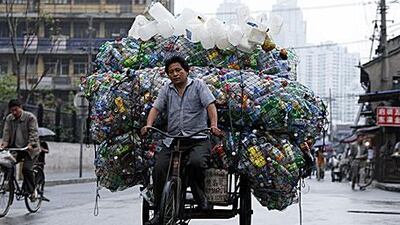ABU DHABI // The director of a documentary that he says inspired Austrian audiences to question the safety of plastic products hopes the film will have the same effect on viewers here. Werner Boote spent 10 years researching and shooting Plastic Planet, which was screened yesterday at the Middle East International Film Festival.
Another sold-out showing is scheduled for this afternoon at Marina Mall. It is one of seven films in festival's new environmental category called "What in the World Are We Doing to Our World?" The documentary was filmed in 25 countries, at sites ranging from a manufacturing plant in Germany to an enormous trash heap in India. Along the way, Boote discovers that even the most innocent-seeming plastic products can contain compounds and chemicals that cause major health problems.
One of the biggest threats, according to the film, is a chemical called bisphenol A, or BPA. It is found in a wide array of plastic products, including baby bottles and reusable food containers. "BPA is proven to be highly dangerous even in low doses," Boote said. "In small doses, the endocrine system thinks it is the hormone oestrogen [produced by ovaries in women] and this is what can cause hormone allergic reactions in people."
The 44-year-old director hopes to rally consumers on the issue. His homeland of Austria, where the film caused "quite a stir" when it premièred last month, was a good start, he said. "There is a big lobby to keep this quiet and not talk too much about it," he said. "Unless consumers start to be aware about this, politicians will continue to side with the industry lobby and nothing will be changed."
He has campaigned extensively on the issue since completing the film. He previously met officials of the Austrian government and the European Commission, and yesterday he met environmental campaigners from Dubai and Abu Dhabi. There have been about 130 studies linking BPA which is believed to leach from containers into food and beverages to breast cancer, obesity and other disorders. A study by the Yale School of Medicine that involved treating pregnant mice with BPA found their female offspring suffered from genetic damage that made them infertile.
The Canadian government has banned BPA. In the US, the six largest manufacturers of baby bottles said they would stop using it. For his film, Boote commissioned chemical analysis on a number of household products. He also had blood tests carried out on himself and his crew to find out how much of the chemical was running through their bodies. Finally, he reviewed 700 scientific papers and interviewed leading researchers, including the American environmental health analyst Theo Colborn, who discovered a list of human-produced contaminants that resemble oestrogen at the molecular level and cause reproductive disorders in animals.
Boote also spoke to Dr Frederic Vom Saal of the University of Missouri, who has campaigned against BPA for decades, and another American scientist, Patricia Hunt, who stumbled on to the issue by chance. "I find her story particularly fascinating," Boote said. "She did not try to find something horrible in plastic. She was doing work on something completely different until she noticed a problem with the test mice."
After investigating all possible causes, Ms Hunt found the health problems were due to high amounts of BPA leaching from the plastic cages where the animals were kept. The film also looks into other potentially harmful plastics such as PVC, used in a wide array of products, including in children's toys and credit cards, and phthalates, found in many beauty products. The dangers, as the film shows, are difficult to avoid. "You can eat and drink plastic, you can inhale it, it even goes through your skin when you touch it," Boote said. The director became so convinced of the dangers he now avoids using plastics.
He said that at the outset of his project he was sceptical. As his research progressed, he struggled to reconcile the findings with his positive view of the product, bolstered by his grandfather's job at a PVC firm in Germany. "He always came from Munich, bringing all those wonderful plastic toys," he said. Boote concluded that the situation has persisted because plastic manufacturers have not been open about the additives they use. "It is a long production line," he said.
"You would need to check every product and substance. But the problem is that you can only check if you know what has been put in there. You cannot check what you do not know." vtodorova@thenational.ae

